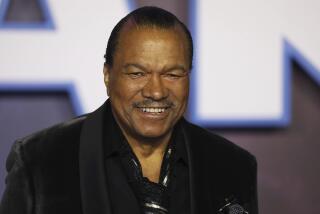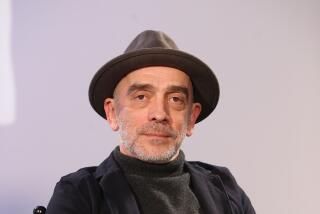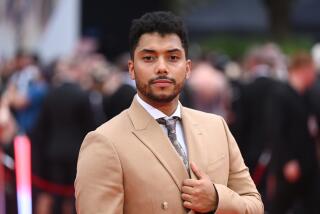Bob Anderson dies at 89; sword-fight teacher to the stars
Ten days before Bob Anderson headed to the 1952 Olympic Games in Helsinki as part of the British fencing team, he responded to a call from a British film studio in need of three fencers to coach the lead actors for sword-fighting scenes in a new pirate movie.
The movie was “The Master of Ballantrae,” starring veteran Hollywood swashbuckler Errol Flynn.
Anderson didn’t win any medals at the Olympics, but he unexpectedly launched a new side career in the movies.
Anderson, 89, who became an Olympic fencing coach while carving out a more-than-50-year career as a fencing trainer to the stars and a movie sword-fight choreographer and stunt double, died early New Year’s Day at a hospital in England, the British Academy of Fencing announced. The cause of death was not disclosed.
“He was truly one of our greatest fencing masters and a world-class film fight director and choreographer,” Philip Bruce, the fencing academy’s president, said on its website.
Over the decades, Anderson was the go-to sword master for films such as “Barry Lyndon,” “Highlander,” “The Princess Bride,” “The Three Musketeers,” “First Knight,” “The Mask of Zorro,” “Pirates of the Caribbean: The Curse of the Black Pearl” and “The Lord of the Rings” films.
Among his famous pupils were Sean Connery, David Niven, Charlton Heston, Peter O’Toole, Roger Moore, Michael Caine, Mandy Patinkin, Richard Gere, Liv Tyler, Antonio Banderas, Catherine Zeta-Jones and Anthony Hopkins.
Anderson also doubled for David Prowse as Darth Vader during lightsaber duels in two “Star Wars” films — “The Empire Strikes Back” and “Return of the Jedi.”
Mark Hamill, who played Luke Skywalker, said in a 1983 interview with Starlog magazine that Anderson’s doubling as Vader “was always supposed to be a secret, but I finally told George [Lucas] I didn’t think it was fair anymore.
“Bob worked so bloody hard that he deserves some recognition. It’s ridiculous to preserve the myth that it’s all done by one man.”
Anderson’s expertise earned the lasting respect of Lucas.
“Bob Anderson was essential in defining what a lightsaber duel would look like,” Lucas said in a statement to The Times on Tuesday. “He was the Jedi Master of the original trilogy, training the actors to duel with a new kind of weapon.
“In ‘Empire’ and ‘Jedi,’ Bob donned Darth Vader’s cape and helmet to battle Luke Skywalker in all of the amazing lightsaber battles. It was pure movie magic that Bob became Vader.”
Anderson took his movie work seriously.
“We used to call him Grumpy Bob on the set, he was such a perfectionist,” Martin Campbell, director of “The Mask of Zorro” and “The Legend of Zorro,” told the New York Times in 2001. “He was incredibly inventive and also refused to treat any of the actors as stars. They would complain about the intensity of the training, but having worked with him, there’s nobody I’d rather use.”
For Anderson, there was nothing like a good old-fashioned movie sword fight.
“The sword is the ultimate weapon,” he said in a 1995 Los Angeles Times interview. “It’s not so threatening shooting at someone at 20 or 30 paces away or while hiding behind things.
“When you get into a sword fight, you’re standing toe-to-toe with someone who’s trying to kill you and you’re looking him in the eye — now that’s thrilling.”
Born Sept. 15, 1922, in Gosport, Hampshire, England, Anderson served with the British Royal Marines during World War II. He was on board the HMS Coventry in the Mediterranean when it was bombed, and he spent eight hours adrift before being rescued.
Anderson, who learned to fence while in the military, became a fencing champion in England after the war and represented Britain at the 1950 and 1953 world championships, as well as the 1952 Olympics.
Errol Flynn was already an experienced movie swordsman when Anderson coached him for “The Master of Ballantrae.” The legendary actor was so impressed with Anderson that he insisted that he rejoin the production after the Olympics ended.
Playing a French pirate during one duel shot on location in Sicily, Anderson accidentally nicked Flynn in the leg with his sword.
“He said it was his fault because he had been distracted by some fans who came into his eye line and he forgot to parry, and I stabbed him,” Anderson recalled in a 2004 interview with the Ottawa Citizen.
In a 1997 Toronto Star interview, Anderson said: “I believe I learned as much from Flynn as I taught him. In fact, Flynn refused to ‘kill’ anyone else. I think I died six times! I also doubled as Flynn, so there are parts in the movie when I even kill myself.”
After competing in the 1952 Olympics, Anderson went on to coach six subsequent British Olympic teams — from the games in Melbourne in 1956 to Montreal in 1976.
Anderson served as technical director of the Canadian Fencing Assn. from 1980 to 1988 in Ottawa, where he developed the Canadian Olympic fencing program. He also wrote a number of books on fencing.
Anderson’s survivors include his wife, Pearl, and three children.
More to Read
Start your day right
Sign up for Essential California for the L.A. Times biggest news, features and recommendations in your inbox six days a week.
You may occasionally receive promotional content from the Los Angeles Times.






